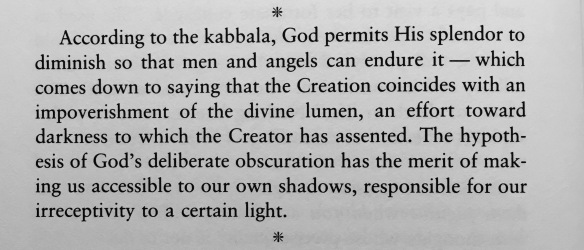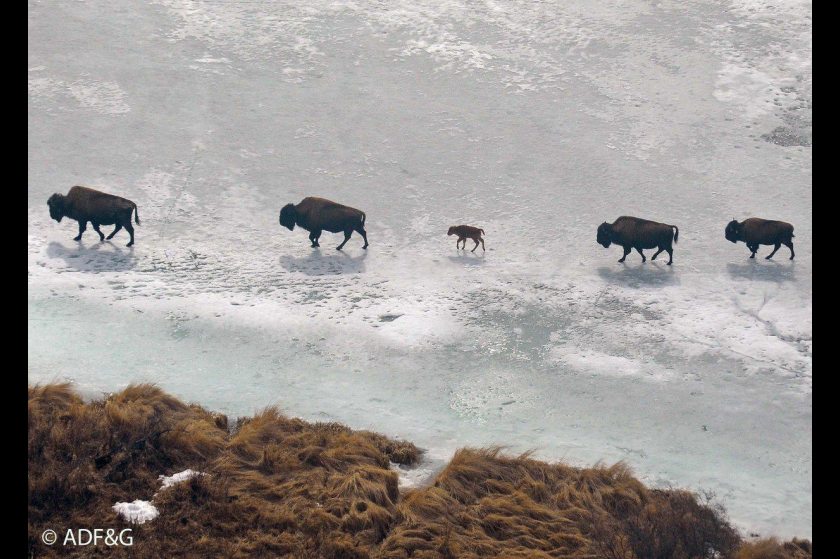~ Artist Louise Bourgeois on How Solitude Enriches Creative Work
Ruined Chernobyl nuclear plant will remain a threat for 3,000 years McClatchy
“In the early days of the Chernobyl disaster [April 1986], many still had faith in the Communist Party, but by late ’88, delusions about the Soviets were long gone. Fear of reprisals had receded with the deaths of strongmen Leonid Brezhnev and Yuri Andropov (known as the Butcher of Budapest after the 1956 Hungarian uprising). So when rumors started swirling about Communist officials evacuating their children while denying the opportunity to parents who wanted to do the same, the mood in Chernivitz grew mutinous. Parents ignored orders to stay put, and within weeks, the town emptied…”
Our irreceptivity to a certain light (E.M. Cioran
“A good writer always works at the impossible.”

From Anathemas and Admirations. Translated by Richard Howard
Marijuana is kosher for Passover, leading rabbi rules The Independent
ACTIVISM IS DEAD – WELCOME TO THE AGE OF ANTHROPOCENTRISM [MCKIBBEN’S DIVESTMENT TOUR – BROUGHT TO YOU BY WALL STREET: PART XIIII OF AN INVESTIGATIVE REPORT] Wrong Kind of Green
The Aeneid plays an outsize role in the cultural literacy of the West. A reminder of the confusing anddisturbing pleasures of epic narrative... Wrong Kind of Kold

Amal Clooney lays the smackdown on Donald Trump, all without even uttering his name. Classy.[Vanity Fair]
“Andersen had the courage to write stories with unhappy endings. He
didn’t believe that you should try to be good because it pays … but
because evil stems from intellectual and emotional stuntedness and is
the one form of poverty that should be shunned.” The Importance of Being Scared: Polish Nobel Laureate Wislawa Szymborska on Fairy Tales and the Necessity of Fear
Here's what we know: Shakespeare was buried on April 25, 1616. How did he die? Many theories - alcoholism, typhus - but little evidence... KaBBala
What’s your favorite work byWilliam Shakespeare? Oxford University Press has created an infographic called Shakespeare and Religion.
Marijuana is kosher for Passover, leading rabbi rules The Independent
ACTIVISM IS DEAD – WELCOME TO THE AGE OF ANTHROPOCENTRISM [MCKIBBEN’S DIVESTMENT TOUR – BROUGHT TO YOU BY WALL STREET: PART XIIII OF AN INVESTIGATIVE REPORT] Wrong Kind of Green
The Aeneid plays an outsize role in the cultural literacy of the West. A reminder of the confusing anddisturbing pleasures of epic narrative... Wrong Kind of Kold

Amal Clooney lays the smackdown on Donald Trump, all without even uttering his name. Classy.[Vanity Fair]
Here's what we know: Shakespeare was buried on April 25, 1616. How did he die? Many theories - alcoholism, typhus - but little evidence... KaBBala
What’s your favorite work byWilliam Shakespeare? Oxford University Press has created an infographic called Shakespeare and Religion.
The piece features references to several Shakespearean plays including Romeo & Juliet, Measure For Measure, and Henry VIII. We’ve embedded the full image below for you to explore further—what do you think? To learn more about the world’s greatest English playwright, follow these links to view infographics on “What Shakespeare Play Should I Read?,” “Shakespeare’s Reading List,” and “Shakespeare and Sex.” Click here to download a free digital copy of The Complete Works of William Shakespeare
At YouGov they offer Shakespeare 400 years on: every play ranked by popularity, as they surveyed 1661 adults and asked: "Which, if any, of the following Shakespeare plays have you ever read or seen ?"
Romeo and Juliet easily tops the list, the only play which more than half the respondents had seen/read;Hamlet is a somewhat surprising distant (31 per cent) fourth -- and I was very surprised that King Lear didn't even break the top ten.
(See also the full(er) survey breakdown (warning ! dreaded pdf format !). Among the observations there: Scottish respondents were less likely than the national average to have seen/read Macbeth -- and far behind Londoners; the only play male respondents were more likely to have seen/read than female ones was ... King John (3 per cent to 2), while several plays were far more likely to have been seen/read by women (notably Romeo and Juliet (62:40) and As You Like it(21:10)); and a far-above average (5 per cent) of Londoners answered 'Don't know' (9 per cent).)

Romeo and Juliet easily tops the list, the only play which more than half the respondents had seen/read;Hamlet is a somewhat surprising distant (31 per cent) fourth -- and I was very surprised that King Lear didn't even break the top ten.
(See also the full(er) survey breakdown (warning ! dreaded pdf format !). Among the observations there: Scottish respondents were less likely than the national average to have seen/read Macbeth -- and far behind Londoners; the only play male respondents were more likely to have seen/read than female ones was ... King John (3 per cent to 2), while several plays were far more likely to have been seen/read by women (notably Romeo and Juliet (62:40) and As You Like it(21:10)); and a far-above average (5 per cent) of Londoners answered 'Don't know' (9 per cent).)

At the New York Times, David Brooks writes a thoughtful article on artistic inspiration, especially for writers:
Well, moments of inspiration don’t quite make sense by normal logic. They feel transcendent, uncontrollable and irresistible. When one is inspired, time disappears or alters its pace. The senses are amplified. There may be goose bumps or shivers down the spine, or a sense of being overawed by some beauty...
Scientists now believe that language and music co-evolved to simulate the most abiding truths of nature. Indeed, for as long as we’ve been able to articulate the human experience, we’ve made music about the most inarticulable parts of it and then used language to extol music’s power — nowhere more beautifully than in Aldous Huxley’s 1931 meditation on how music stirs the soul, in which he asserted that music’s greatest potency lies in expressing the inexpressible. How Music Helps Us Grieve
"Dearly Beloved we are gathered here today to get through this thing we call ‘Life.'” Prince 1958 – 2016."
We watched 2004 movie Primer with barely any knowledge of it, which may be the best way to watch it. Shane Carruth wrote, directed, and stared in this detailed sci-fi story about four entrepreneurs who hope to make some kind of break-through on one of their garage-lab projects. When Abe discovers that a box they made does something unexpected, he tells Aaron and the two decide to pursue it. The scene below gives you a taste of the movie’s style while showing Abe and Aaron conducting their first experiment
Lot of complex things going on right now. Too complex to put into 140 characters
The best all-purpose tweet, ever
Blanche and Alfred Knopf had a simple plan: “We would get married and make books and publish them.” Reality was more complicated - and interesting...RealPolitics
FASTER, PLEASE: Amazing! A Blind Boy Gets to See His Mother for the Very First Time.
Related: How eSight Works
Scientists now believe that language and music co-evolved to simulate the most abiding truths of nature. Indeed, for as long as we’ve been able to articulate the human experience, we’ve made music about the most inarticulable parts of it and then used language to extol music’s power — nowhere more beautifully than in Aldous Huxley’s 1931 meditation on how music stirs the soul, in which he asserted that music’s greatest potency lies in expressing the inexpressible. How Music Helps Us Grieve
"Dearly Beloved we are gathered here today to get through this thing we call ‘Life.'” Prince 1958 – 2016."
“All great truths are obvious truths. But not all obvious truths are great truths.”
We watched 2004 movie Primer with barely any knowledge of it, which may be the best way to watch it. Shane Carruth wrote, directed, and stared in this detailed sci-fi story about four entrepreneurs who hope to make some kind of break-through on one of their garage-lab projects. When Abe discovers that a box they made does something unexpected, he tells Aaron and the two decide to pursue it. The scene below gives you a taste of the movie’s style while showing Abe and Aaron conducting their first experiment
Professor Paula Franzese of Seton Hall law school is something of a patron saint of law students. Widely known for her upbeat energy, kindness, and tendency to break into song for the sake of helping students remember a particularly challenging point of law, Paula has literally helped hundreds of thousands of lawyers pass the bar exam through her video taped Property lectures for BarBri.Paula is such a gifted teacher that she won teacher of the year almost ever year until Seton Hall implemented a rule to give others a chance: no professor can win teacher of the year more than two years in a row. Since the rule was implemented, Paula wins every other year. She’s also incredibly generous, leading seminars and workshops to help her colleagues improve their teaching.Paula recently wrote a book encouraging law students to have a productive, upbeat happy, and grateful outlook on life (A short & happy guide to being a law school student).Paula’s well-intentioned book has rather bizarrely been attacked by scambloggers as “dehumanizing”, “vain”, “untrustworthy” and “insidious.” The scambloggers are not happy people, and reacted as if burned by Paula’s sunshine Happiness law students lawyers and scambloggers
Lot of complex things going on right now. Too complex to put into 140 characters
The best all-purpose tweet, ever
Blanche and Alfred Knopf had a simple plan: “We would get married and make books and publish them.” Reality was more complicated - and interesting...RealPolitics